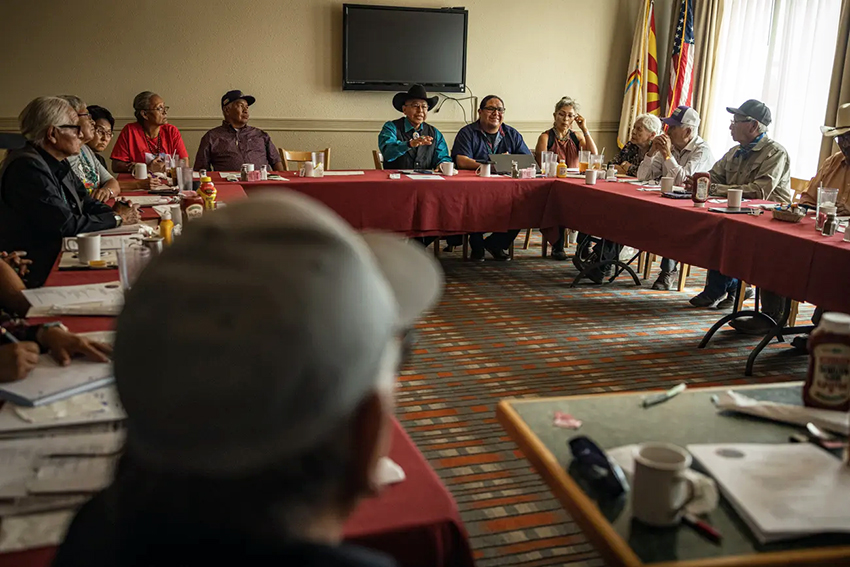Peyote is the darling of the psychedelics renaissance. Indigenous users say it co-opts ‘a sacred way of life’
On the first day of autumn, evening temperatures near Window Rock, Arizona, were brisk. Beneath the late September sky, a traditional round hogan in this remote corner of the Navajo Nation was enveloped in darkness. Ten tribal members gathered inside.
After a dinner of mutton and fry bread, the group settled in a circle around a wood stove radiating with burning juniper, preparing to ingest what the Diné (Navajo) call azeé – the medicine.
Most people know azeé as peyote: a small, button-like cactus famed for its powerful psychoactive and healing properties. The cactus is extremely rare in the United States – it grows wild in only one part of Texas – and has been integral to traditional Indigenous American practices for thousands of years.
The goal of this ceremony was to guide Diné college students on their spiritual path. One young man struggling with alcohol abuse was especially in need of the medicine.
“When this is over, you will feel like a washrag with all the gunk wrung out of it,” the man’s grandmother told him.
Tonight, the ritual would be no different from what it was a century ago. There would be peyote songs and drumming. Margie Whitney-Silva, a certified spiritual leader known as a roadman, would supply the peyote in the form of a tea brewed from the cactus, carried in a large pickle jar. Eagle-feather fans and gourd rattles would be used as the jar was passed around.
During the 19th and first half of the 20th centuries, Indigenous Americans risked being thrown in jail for participating in such ceremonies because peyote was illegal under US law. Today, it is just the opposite. Peyote and mescaline – the hallucinogenic substance found inside the cactus – have become a darling of the psychedelic renaissance.
Peyote, mescaline and other hallucinogenics such as LSD, MDMA, ayahuasca and magic mushrooms are being touted for their capacity to revolutionise the treatment of PTSD, addiction and other health problems. In recent years, progressive politicians, doctors, community groups and Silicon Valley investors alike have thrown their weight behind decriminalization bills in dozens of US states and cities.
Their goal to spread the benefits of psychedelics may be well-intentioned, but for Indigenous Americans, the boom has a dark side that rarely comes up in venture capital pitches. Many Diné tribal members are describing this moment as a “peyote crisis” that threatens to appropriate and commodify their sacred way of life.
Their concerns are multifold. Decriminalizing peyote could fuel poaching and a black market for the slow-growing cactus, whose limited habitat is already threatened by climate change and development. A sudden surge in demand might completely wipe out peyote from its natural environment, traditional practitioners say.
Then there are the deeper concerns about turning peyote and mescaline into an on-demand drug. Members of the Native American church of North America, an inter-tribal religion that revolves around the ancient practice of peyotism, are alarmed by pharmaceutical ventures seeking to create mescaline in a lab, in much the same way opium from the poppy flower was synthesized to create fentanyl.
Non-Indigenous leaders in the psychedelic space insist they are respecting Native American spirituality by using synthetic mescaline instead of the real thing. Dozens of Indigenous Americans interviewed for this story see it otherwise.
“How would Christians feel if Jesus Christ was cloned?” asked Justin Jones, a Diné peyote practitioner and legal counsel for the Native American church of North America, a non-profit organization that advocates for more than 300,000 members. “And while the real Jesus is protected, people could do whatever they wanted to the clone.”
At its core, the push to medicalize and mass-produce peyote and mescaline goes against the Indigenous American worldview of interconnectedness. There are no English words that describe how the spiritual character of peyote is inextricably intertwined with its hallucinogenic properties, the land where it grows and the Indigenous Americans who consume it, says Jones. In the Navajo language, Jones describes this harmonic oneness as azee’ hinááh biníłch’idiyin, be’adínídíín.
Creating synthetic mescaline in a lab or growing peyote in a greenhouse is a violation of natural law, and interrupts the unique symbiotic relationship with the plant. “What western scientists call mescaline is for us the essence of the medicine,” said Jones. “It is the soul of it and what makes it holy.”
Traditional peyote practitioners emphasise that they are not against the use of all psychedelics to innovate new treatments for addiction and PTSD. After all, their experiences prove just how powerful a healing tool these substances can be.
But they question why peyote and mescaline need to be used when a variety of other tools – especially psilocybin and MDMA – have proven effective. In rushing to medicalize peyote, which has a unique history and a sacred role for tribes, the decriminalisation movement risks perpetuating more harm in the name of doing good, they say.
“I’m all for healing,” said Cora Maxx-Phillips, a social worker, member of the Navajo Nation human rights commission and board member of the Council of Peyote Way of Life Coalition, a grassroots group in the Navajo Nation.
“But don’t do it at the expense of our people, who are trying to survive the multigenerational trauma inflicted upon us. Please, leave us alone.”
Read full article in link.







